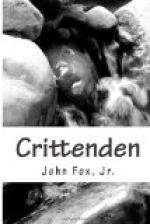II
The train slackened speed and stopped. There was his horse—Raincrow—and his buggy waiting for him when he stepped from the platform; and, as he went forward with his fishing tackle, a livery-stable boy sprang out of the buggy and went to the horse’s head.
“Bob lef’ yo’ hoss in town las’ night, Mistuh Crittenden,” he said. “Miss Rachel said yestiddy she jes knowed you was comin’ home this mornin’.”
Crittenden smiled—it was one of his mother’s premonitions; she seemed always to know when he was coming home.
“Come get these things,” he said, and went on with his paper.
“Yessuh!”
Things had gone swiftly while he was in the hills. Old ex-Confederates were answering the call from the Capitol. One of his father’s old comrades—little Jerry Carter—was to be made a major-general. Among the regulars mobilizing at Chickamauga was the regiment to which Rivers, a friend of his boyhood, belonged. There, three days later, his State was going to dedicate two monuments to her sons who had fallen on the old battlefield, where his father, fighting with one wing of the Legion for the Lost Cause, and his father’s young brother, fighting with the other against it, had fought face to face; where his uncle met death on the field and his father got the wound that brought death to him years after the war. And then he saw something that for a moment quite blotted the war from his brain and made him close the paper quickly. Judith had come home—Judith was to unveil those statues—Judith Page.
The town was asleep, except for the rattle of milk-carts, the banging of shutters, and the hum of a street-car, and Crittenden moved through empty streets to the broad smooth turnpike on the south, where Raincrow shook his head, settled his haunches, and broke into the swinging trot peculiar to his breed—for home.
Spring in the Bluegrass! The earth spiritual as it never is except under new-fallen snow—in the first shy green. The leaves, a floating mist of green, so buoyant that, if loosed, they must, it seemed, have floated upward—never to know the blight of frost or the droop of age. The air, rich with the smell of new earth and sprouting grass, the long, low skies newly washed and, through radiant distances, clouds light as thistledown and white as snow. And the birds! Wrens in the hedges, sparrows by the wayside and on fence-rails, starlings poised over meadows brilliant with glistening dew, larks in the pastures—all singing as they sang at the first dawn, and the mood of nature that perfect blending of earth and heaven that is given her children but rarely to know. It was good to be alive at the breaking of such a day—good to be young and strong, and eager and unafraid, when the nation called for its young men and red Mars was the morning star. The blood of dead fighters began to leap again in his veins. His nostrils dilated and his chin was raised proudly—a racial chord touched within him that had been dumb a long while. And that was all it was—the blood of his fathers; for it was honor and not love that bound him to his own flag. He was his mother’s son, and the unspoken bitterness that lurked in her heart lurked, likewise, on her account, in his.




